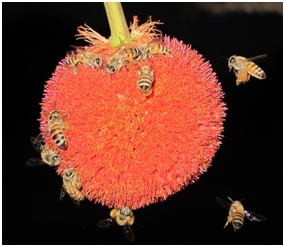Honey bees ensure the pollination of Parkia biglobosa in absence of bats
DOI:
https://doi.org/10.26786/1920-7603(2017)2Abstract
One of the socio-economically important West African parkland trees, Parkia biglobosa yields pods consumed by people and animals. Being animal-pollinated, it is unknown how climate change will affect the species if the guild of pollinators changes. Here, we compare the pollinator guilds and the pod production at two climatically different study sites: the first site, Tiba was drier with lower tree density and fewer fruit bats, whereas the second site, Pinyiri was more humid, with higher tree density and more fruit bats. We carried out a pollinator exclusion trial with bags separating the flower-visitors and made observations of the flower-visitors. Furthermore, we calculated pollination distances based on paternity analysis of the seeds produced within the trial. The numbers of immature fruits were similar for the sites, but the drier site, Tiba experienced more abortion and decreased pod set. At both sites, exclusion of bats led to marginally reduced pod set, while exclusion of bats and honey bees led to significantly reduced pod set. We found a small effect of stingless bees and solitary bees but only at the more humid site, Pinyiri. Tiba experienced a higher level of self-pollination, fewer pollen donors per tree, and longer median distances of pollen flow, compared with Pinyiri. Implications of the results for management of the species and its pollinators in the face of climate change are discussed.
Downloads
Published
How to Cite
Issue
Section
License
Copyright (c) 2017 Kristin Marie Lassen, Moussa Ouédraogo, Yoko Luise Dupont, Erik Dahl Kjær, Lene Rostgaard Nielsen

This work is licensed under a Creative Commons Attribution 4.0 International License.
JPE is an open access journal which means that all content is freely available without charge to the user or his/her institution.
Authors who publish with this journal agree to the following terms:
1) Authors retain copyright and grant the journal right of first publication with the work simultaneously licensed under a Creative Commons Attribution License that allows others to share the work with an acknowledgement of the work's authorship and initial publication in this journal.
2) Authors are able to enter into separate, additional contractual arrangements for the non-exclusive distribution of the journal's published version of the work (e.g., post it to an institutional repository or publish it in a book), with an acknowledgement of its initial publication in this journal.
3) Authors are permitted and encouraged to post their work online (e.g., in institutional repositories or on their website) prior to and during the submission process, as it can lead to productive exchanges, as well as earlier and greater citation of published work (See The Effect of Open Access).
To assure a broader targeted audience, content will be included into databases (such as EBSCO) and directories (such as DOAJ).











